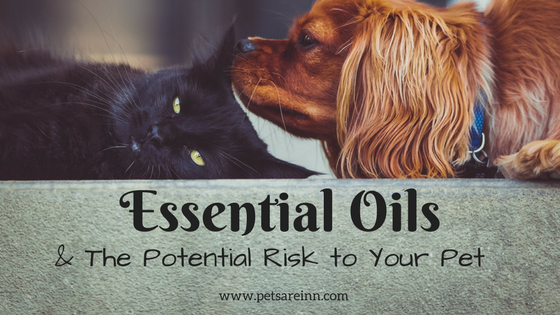Essential Oils and Your Pet
While you may find that using essential oils, like lavender or eucalyptus, for aromatherapy helps you relax, it’s important to keep in mind that these oils can also pose safety risks to pets and people.
 Essential oils have been in the news recently, largely due to reports that incidences of poisonings among children have risen. Children are at risk of poisoning because they may try to ingest the oils, but pets are also at risk. If you use essential oils, here are some rules of thumb to help keep your pet safe. And remember, if you think your pet may have consumed or had contact with essential oils, call the ASPCA Animal Poison Control Center hotline at 888-426-4435 and contact your veterinarian.
Essential oils have been in the news recently, largely due to reports that incidences of poisonings among children have risen. Children are at risk of poisoning because they may try to ingest the oils, but pets are also at risk. If you use essential oils, here are some rules of thumb to help keep your pet safe. And remember, if you think your pet may have consumed or had contact with essential oils, call the ASPCA Animal Poison Control Center hotline at 888-426-4435 and contact your veterinarian.Essential Oils Can Be Toxic
Aromatherapy uses essential oils to create scents that we humans can enjoy. But it’s important to realize that many of these substances are volatile compounds, which means they can be potentially toxic to pets at certain concentrations. Cats can be especially sensitive to essential oils. Keep in mind that what is safe for you to use isn’t necessarily safe to use on or near your pet. Your pet can inadvertently inhale, lick or eat these essential oils, and the oils can even be absorbed through your pet’s skin. Your pet reacts differently to these substances than you do, so it’s important that you talk to your veterinarian before using them around your furry family members.
Essential Oils Potentially Toxic to Cats
The use of essential oils on cats is typically discouraged. In some circumstances, some can be used to treat certain ailments under a veterinarian's supervision if they are diluted; otherwise, they should be avoided. (Note that this list is not all-inclusive.)
- Peppermint
- Lemon Oil
- Lavender Oil
- Melaleuca Oil
- Tea Tree Oil
- Cinnamon Bark Oil
- Wintergreen Oil
- Thyme Oil
- Birch Oil
- Other oils containing phenol
Dogs and cats have a much better sense of smell than we do, and what smells good to us may be overwhelming for them. You wouldn’t want to be trapped on an elevator with an overly perfumed companion, so always make sure your pets have a way to escape from smells that you think are wonderful — those same scents might in fact be irritating to them. Birds in particular should be safeguarded from strong scents — they have very different and more sensitive respiratory tracts than we do, and the inhalation of essential oils is not recommended.
Safe to Smell Is Not Safe to Soothe
Many natural pet care products appear to contain the same substances used in human aromatherapy products. But that does not mean any aromatherapy product should be used indiscriminately on your pet. Essential oils in pet care products are generally constituted in greatly diluted amounts. For example, many natural flea shampoos may contain essential oils, but because of the dilution of these oils with other ingredients, they are generally safe to use according to label directions. Remember, always follow the directions and never assume more is better. And for these reasons, never apply 100 percent essential oils from aromatherapy products on your pet, especially on broken skin. The volatile compounds can quickly be absorbed into the bloodstream and possibly damage vital organs. Essential oils should also never be given orally, because many of them can damage the liver. If your pet has ingested essential oils, call your veterinarian immediately.
Potpourri Precautions
Liquid potpourri should never be used on or ingested by your pet. Liquid potpourri (the kind made for simmering pots) is a combination of essential oils and cationic detergents. The detergents can cause chemical burns in the mouth and on the skin. Be sure to keep any such burners away from areas that your pets can access. If your pet does accidentally come in contact with liquid potpourri, bathe him with hand-safe dishwashing detergent until you can no longer smell the potpourri and call your veterinarian. If you see any burns or your pet is drooling or vomiting, take your pet to your veterinarian immediately.
Source: VetStreet




Comments
Post a Comment